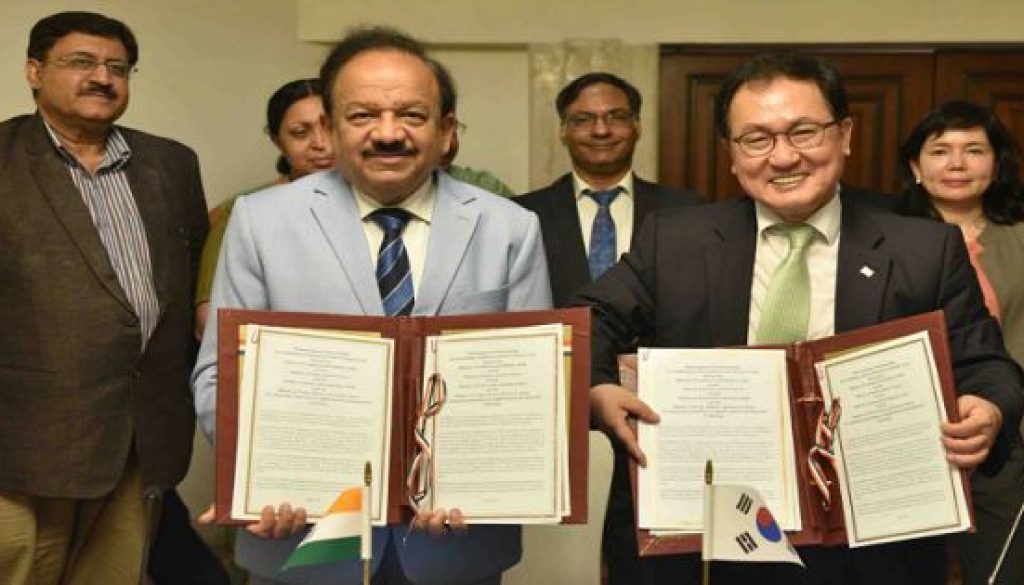India, Morocco sign MoU for technology transfer
In an effort to facilitate transfer of
Indian technologies and products to Morocco and promote MSMEs, India and
Morocco have signed an MoU.
Indian technologies and products to Morocco and promote MSMEs, India and
Morocco have signed an MoU.
The agreement signed in Rabat, Morocco, is to deepen cooperation between MSME sectors of the two countries.
The MoU was signed by CMD, National Small
Industries Corporation (NSIC), Ravindra Nath and Director General,
Maroc PME, Mr. Rabri Barrazouka.
Industries Corporation (NSIC), Ravindra Nath and Director General,
Maroc PME, Mr. Rabri Barrazouka.
Through this MOU, the NSIC and Maroc PME will work together to enhance cooperation opportunities for MSMEs of both countries.
Ms. Alka Arora, Joint Secretary in the
Ministry of MSME, who is leading the official delegation along with CMD
NSIC to Morocco held bilateral meetings with Mr. Othman El Ferdaous,
Secretary of State in the Ministry of Industry,
Investment and Trade and Digital Economy and with other related
Departments for enhancing cooperation in MSME Sector.
Ministry of MSME, who is leading the official delegation along with CMD
NSIC to Morocco held bilateral meetings with Mr. Othman El Ferdaous,
Secretary of State in the Ministry of Industry,
Investment and Trade and Digital Economy and with other related
Departments for enhancing cooperation in MSME Sector.
Both sides discussed the ways and means
to synergize the strengths of both countries in MSME Sector in terms of
capacity building, sharing of experiences, exchange of business
delegations for creating linkages, JVs and technology
transfers.
to synergize the strengths of both countries in MSME Sector in terms of
capacity building, sharing of experiences, exchange of business
delegations for creating linkages, JVs and technology
transfers.
Morocco mainly relies on its exports of
minerals and ores and SERVICE sector. It has very small MSME sector in
manufacturing, whereas India has strong MSMeE sector especially in
manufacturing.
minerals and ores and SERVICE sector. It has very small MSME sector in
manufacturing, whereas India has strong MSMeE sector especially in
manufacturing.
Over the years, India and Morocco have
enjoyed cordial and friendly relations and bilateral relations have
witnessed significant growth.
enjoyed cordial and friendly relations and bilateral relations have
witnessed significant growth.
India is one of the major markets for
Moroccan phosphate and its derivatives. An India-Morocco joint venture
in fertilizer sector in Morocco, called IMACID, was set up in November
1999.
Moroccan phosphate and its derivatives. An India-Morocco joint venture
in fertilizer sector in Morocco, called IMACID, was set up in November
1999.
At present, the JV is producing around 430,000 MT per annum of phosphoric acid, nearly all of which is imported by India.
The Moroccan phosphate company, OCP, has invested in Paradip Phosphates Ltd. in India.
Other main items of export to India are metallic ores and metal scrap, semi-finished products and inorganic chemicals.
The main items of India’s exports to
Morocco are cotton yarn, synthetic fiber, transport equipment,
pharmaceuticals, agricultural implements, chemicals, spices and
manufactured metals.
Morocco are cotton yarn, synthetic fiber, transport equipment,
pharmaceuticals, agricultural implements, chemicals, spices and
manufactured metals.
The balance of trade has been in favour of Morocco because of imports of phosphoric acid and rock phosphate by India.
The quantum of bilateral trade, which was
US$ 1.63 billion in 2010, reached to US$ 2.04 billion in 2011. However,
in 2014, it decreased and stood at $ 1.36 billion.
US$ 1.63 billion in 2010, reached to US$ 2.04 billion in 2011. However,
in 2014, it decreased and stood at $ 1.36 billion.
Indian exports to Morocco in 2014
decreased by 21.6% compared to the previous year while Moroccan exports
to India registered an increase of 10.2% in 2014.
decreased by 21.6% compared to the previous year while Moroccan exports
to India registered an increase of 10.2% in 2014.




